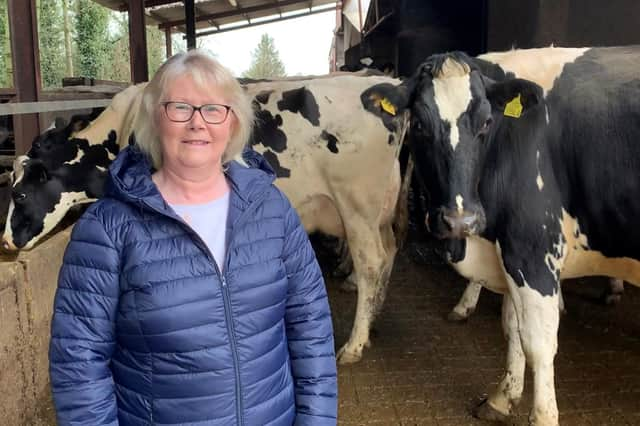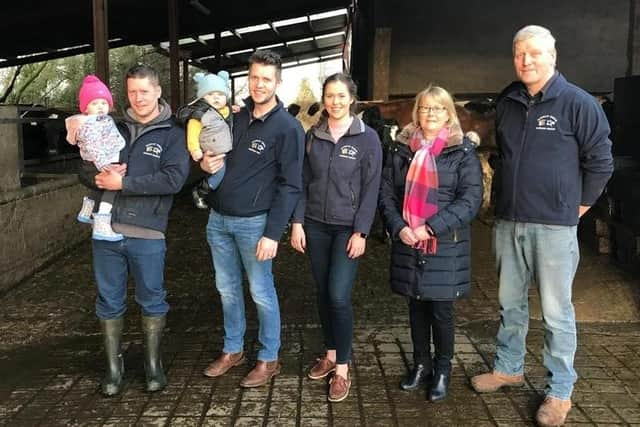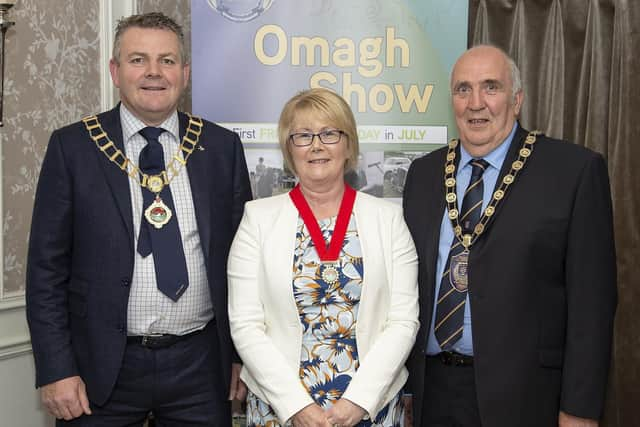We need more women in farming


They are the most unrepresented sector of society within our industry.
For years I have heard farm leaders telling the world about the need to bring the brightest and best into the world of farming. But, in truth, this has been nothing but meaningless chatter.
Advertisement
Advertisement
The, reality, of course is that women represent 50% plus of the population, yet so few of them take on real farm management roles as they consider their own career paths.


Currently, women represent 12% of Northern Ireland’s land owning population. I note this point. But land ownership has very little to do with the glaring need to get more women involved in the decision making associated with production agriculture.
The reasons that we find farming to be such an underrepresented industry, where women are concerned, reflects a way of life that should have been ‘killed off’ 50 plus years ago.
Farming today is not all about men rolling up their sleeves and getting on with the jobs in hand: there are lots of machines and ‘tech’ available to met this need.
Advertisement
Advertisement
The real challenge facing production agriculture is having people with the intellect, education and enthusiasm to bring the industry forward against a back drop of climate change and the need to deliver global food security.


Women have all these attributes in abundance, which is why I make the point: steps should be taken on a proactive basis to attract more women into farming. And the clock is ticking.
The veterinary profession has no difficulty in attracting women within its ranks. I am sure that most Irish farmers will have had the opportunity of working with female vets over recent years.
There are provisions within the current TAMS scheme, operating in the Republic of Ireland, that specifically relate to the role of women in Irish agriculture. But this is only the tip of the iceberg, in terms of government and farming society as a whole making the proactive case for women in farming.
Advertisement
Advertisement
Ten or so years ago, the industry found itself in a similar situation, where the role of young people within farming is concerned. Today, our farm support systems actively reflects the needs of young people, as does the Land Mobility Programme.
So do we need proactive measures of a similar kind taken to specifically encourage young women into agriculture? Of course we do.
We also need to encourage more girls to look at agriculture as a serious study option for them, both at school and beyond that at third level.
Meanwhile, the Stormont Assembly is to actively investigate the role of women within Northern Ireland’s farming sectors.
Advertisement
Advertisement
Agriculture, Environment and Rural Affairs (AERA) Committee Chairman Declan McAleer MLA has said that steps must be taken to recognise the huge contribution that women make to the agriculture sector.
He added: “It is regrettable that Ireland has one of the lowest proportion of female farm managers across Europe. In the north, only 9% of farms have women registered as the main farmer while the EU average is 29%.
“Women play a huge role in managing farm businesses but their work is largely ‘invisible’. The patriarchal system where land is passed from father to son has been hugely detrimental to the succession of women as farm manager. This practice is reflected by the fact that only 12% of landholders in the south are women.
“Whilst it is important that we take steps to address the historic under representation, it is also vital to stress that at this time of great challenge and change for the sector, farming needs more women at the helm as they are more adaptable to change and more likely to engage in diversification.
Advertisement
Advertisement
McAleer went on to point out that the 2018 (Department of Agriculture, Environment and Rural Affairs (DAERA) Equality Indicator Report found that women were twice as likely as men to diversify and engage in ‘Other Types’ of farming activity.
He commented:“The issue of redressing gender imbalance is central to the new EU Common Agriculture Policy (2023-27). Unfortunately, we are no longer in the EU so we must take steps to ensure that gender equality is central to our new farm policy here in the north.
“We already have seen some good examples from the south who are bringing forward incentives such as increasing the grant rate to 60% for women under the Targeted Agriculture Modernisation Scheme (TAMS) and introducing Knowledge Transfer groups specifically for women.
“I believe there are lessons and good practise that can be learnt from other jurisdictions and countries but in the first instance the committee want to hear from local people, particularly women, about the barriers they experience and how these can be overcome.
Advertisement
Advertisement
“I strongly encourage people to complete the survey online using Citizenspace.
“The link will be on our committee page for the next six weeks.
“We intend to collate the findings and use these to make recommendations for future policy provision. I strongly encourage people to have their say on this important issue.”
Meanwhile, NFU Scotland has welcomed the news that the personal development programme for women in agriculture has been launched, with applications for 2022 now live.
Advertisement
Advertisement
The Scottish Government-funded ‘Be Your Best Self’ programme is an integral part of its vision to make Scottish agriculture a fairer, more inclusive industry, where farm succession is not determined by gender, training is accessible to everyone, and more women take on senior roles in agricultural organisations.
The programme follows a successful pilot run in 2019-20 and will support up to 200 women over the next two years.
Be Your Best Self aims to support women living or working in agriculture in Scotland to build their confidence, enhance their skills, and develop their leadership abilities. Several team members within NFU Scotland participated in the pilot including Head of Policy Team Gemma Cooper who said: “It is fantastic to see Scottish government further invest in the development of women in agriculture in Scotland. From personal experience, this is an excellent programme and one that any woman working in Scottish agriculture should consider.
“This course is the next stage from work carried out by the Women in Agriculture Taskforce, a panel which included past NFUS President, Andrew McCornick. The pilot courses had excellent feedback and I know they were a huge benefit to those who attended them.
Advertisement
Advertisement
“Investment such as this can only be a positive thing for industry and for organisations such as NFUS as it will help ensure that talented individuals are enabled to progress in their careers and in representative organisations.”
Not surprisingly, Ulster Farmers’ Union Rural Affairs Committee chair Jennifer Hawkes is keen that similar measures are implemented in Northern Ireland...and soon.
She farms with husband Kenneth and son Graeme on their dairy and sheep enterprise, close to Omagh in Co Tyrone.
She explained: “The union hosted a tremendously positive Women in Agriculture conference back in 2019. And this was followed up by an equally successfully series of webinars earlier this year.
Advertisement
Advertisement
“We have kept in close contact with colleagues in other parts of the UK while also forging a very strong working relationship with the Women in Business organisation here in Northern Ireland.”
According to Hawkes, agriculture is still a very male-dominated industry. However, the UFU is committed to seeking recognition and empowerment for women in the industry while also showing young students the array of opportunities that are available within the industry.
She views the steps now being taken by the Stormont AERA committee as being vital in actually quantifying the role that women play on farms and across agriculture in Northern Ireland as a whole.
Hawkes continued:
“Only by fully identifying the role played by women within agriculture can we move forward and establish real policies that reflect this dynamic.”
Advertisement
Advertisement
Hawkes pointed to the tremendous skills base that women bring to the farming sectors.
A case in point is the tremendous potential represented by women marrying into farming, who have already enjoyed very successful careers in other sectors.”
She also views the need for government to deliver effective support and training opportunities for women working actively within farming.
She said: “These must be made available in a wholly flexible manner. Women with young families or care commitments to relatives cannot drop everything and attend courses that are offered between 9.00am and 5.00pm.
Advertisement
Advertisement
“Other ways of making the training opportunities that women need available in a more appropriate manner must be looked at.”
The UFU representative also views the need to ensure that more women can enjoy successful careers at an agri industry level as a priority.
She explained: “Again, the opportunities that can be availed of by individual women and the farming industry as a whole are more than significant.”
One of the key findings of research into women in farming and the agriculture sector across Scotland was that there was a clear need for more access to, and uptake of, vocational, practical training for women across the industry.
Advertisement
Advertisement
Currently, LANTRA provides a number of vocational courses in this context. They include: business skills; environmental and sustainability; health and safety; plants and animals; vehicles, machinery and equipment. Other courses will be considered if applicants sufficiently demonstrate the relevance and value of the training.
Specific funding is made available by the Scottish government to facilitate the participation of women in these courses.
Jennifer Hawkes concluded: “The agri-food industry has come on massively over the past number of years with more women managing farm businesses and taking on leadership roles due to their hard work, perseverance and a passion for what they do.
“However, it is still a very male dominated industry and we want to continue recognising and empowering women in the industry while showing young students the array of opportunities that are available in agriculture.
Advertisement
Advertisement
“Farm Minister Edwin Poots has committed to considering a women in agriculture taskforce, similar to that in Scotland.
“An initiative of this nature will give women in farming access to the same development opportunities as men in this sector through training opportunities and funding.
“This is an extremely positive statement and the rural affairs committee look forward to engaging with the minister and DAERA officials to make this a reality. It is important that all women involved in a family farm business and the wider agricultural industry participate in the AERA Citizenspace survey.”
The survey can be accessed on: http://www.niassembly.gov.uk/assembly-business/committees/2017-2022/agriculture-environment-and-rural-affairs/